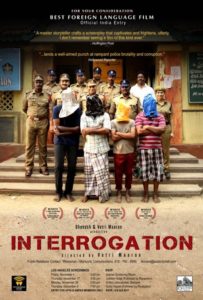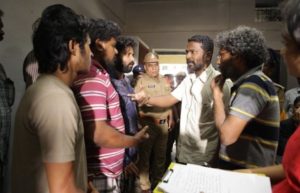 Only three films from India have ever been nominated in the Best Foreign Language Film category since the Academy started it in 1957, with Mother India that first year, and the last being Lagaan, in 2001. Surprisingly, none of those nominees was a film directed by the great Satyajit Ray (though Ray eventually won an Honorary Oscar).
Only three films from India have ever been nominated in the Best Foreign Language Film category since the Academy started it in 1957, with Mother India that first year, and the last being Lagaan, in 2001. Surprisingly, none of those nominees was a film directed by the great Satyajit Ray (though Ray eventually won an Honorary Oscar).
I’m discussing all this with Vetrimaaran, or “Vetri,” the director of Interrogation, this year’s official selection by India for the Oscar derby.
Vetri remains honored, and still a little amazed, that his political thriller, a story “not only of what’s happening in my country, but around the world in different degrees,” was picked. Not least because it was shot in Tamil, rather than Hindi, or Bengali — joining a small list of films from that southernmost region to have been previous “official picks,” from India, a land with 150 “main” languages, and upwards of 1600 local ones.
But there’s also surprise because this intensely political film is akin to the works of Costa-Gavras, a director that both Vetri, and his interviewer, greatly admire, but whose sensibilities would appear to have fallen out of favor in an era of inflexible and over-compensatory nationalism. India, with the election of Narendra Modi, prefigured the U.S. in voting in a leader who was, in turn, contemptuous of democracy. Which makes the critiques in Interrogation — a tale of itinerant workers being framed for crimes they didn’t do by a police force far more interested in “closing” cases, rather than solving them — all the more unusual in the present moment.
What makes it more interesting still is that Interrogation’s tale of torture, brutality, and political corruption, is true. Or rather, are true, since Vetri took three different political and policing scandals in the state of Tamil Nadu, and combined them into this film’s single narrative.
Vetri has already made several films in his native Tamil Nadu, and likes to work with a close-knit crew that he takes with him from project to project. However, he received a shock on this film when his editor, T.I. Kishore, dropped dead, at the age of 36, in the middle of a conversation with the director after principal photography had completed. “He just fell on his keyboard,” Vetri recounted, still visibly shocked by the memory while sitting in his publicist’s office in Los Angeles.
 They were getting ready for “a final cut to show at Cannes,” and Kishore’s assistant eventually took over. “I feel while shooting I lose the film,” Vetri said, “but in editing, I rediscover it.” Though not usually with such profound shocks accompanying that rediscovery.
They were getting ready for “a final cut to show at Cannes,” and Kishore’s assistant eventually took over. “I feel while shooting I lose the film,” Vetri said, “but in editing, I rediscover it.” Though not usually with such profound shocks accompanying that rediscovery.
But even if the pacing of the story is reclaimed in post, it’s hard to imagine any of Interrogation’s intensity could be forgotten during the shoot.
The film was done using “short, focal lenses,” of the Super 35 variety, while shooting on a Red. Vetri and his cameraman, Rama Lingam, who’d been an assistant on the director’s previous movies, were with the cast in a 10 x 20 foot room for six straight days, for numerous harrowing sequences of torture and abuse, being in a sense confined “along with the prisoners,” as he describes it. After each break, they were “reluctant to go back in.”
Later, after a seeming release, the hapless trio of workers, whose real-life mistreatment sparked the book on which the film is initially based, find themselves working at a second police station in another city, where an even higher level of corruption turns out to be unfolding.
 For this more cavernous space (where digital ceilings had to be added in post production), the lighting becomes even more high contrast, “subtle differences” that the director wanted to impart, until the night-set climax of the film nearly appears as black-and-white.
For this more cavernous space (where digital ceilings had to be added in post production), the lighting becomes even more high contrast, “subtle differences” that the director wanted to impart, until the night-set climax of the film nearly appears as black-and-white.
The stories, Vetri says, were “a grief we wanted to share,” perhaps an echo of Costa-Gavras’ observation that “the purpose of art is not to entertain — the purpose of art is to disturb.” In any case, the intensity of that sharing lead Vetri, along with cast and crew, to do a cleansing “spiritual retreat, to do yoga, breathing exercises,” and whatever else they could do to release what lingering grief was called up in retelling these stories.
Though Interrogation’s particular sharing has already lead to an Amnesty International award at the Venice Film Festival. And now, this story about “innocence — and people who are powerless being expendables,” will see if it can go where even the great Ray was never able to tread.





